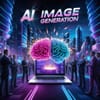The emergence of AI-powered image generation tools has sparked a heated debate about copyright and ethics. These tools, which can create realistic images from text prompts, have raised concerns about the ownership and authorship of generated content.
At the center of the debate is the question of whether AI-generated images can be considered copyrighted works. Some argue that AI-generated images are not eligible for copyright protection because they are created by machines, rather than humans. Others claim that the AI algorithms used to generate these images are themselves creative works, and therefore entitled to protection.
The issue has significant implications for artists, designers, and other creatives who rely on their work for income. If AI-generated images are deemed to be copyrighted, it could potentially disrupt the entire creative industry. On the other hand, if they are not protected, it could lead to widespread exploitation of AI-generated content.
The debate is further complicated by the fact that AI image generation tools are becoming increasingly sophisticated. Some tools can create images that are nearly indistinguishable from those created by humans. This has raised concerns about the potential for AI-generated images to be used for nefarious purposes, such as creating deepfakes or propaganda.
As the debate continues, it is clear that there are no easy answers. However, one thing is certain: the emergence of AI image generation tools has sparked a critical conversation about the intersection of technology, creativity, and law. As we navigate this new landscape, it will be essential to consider the implications of AI-generated content on our understanding of ownership, authorship, and creativity.


